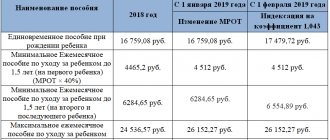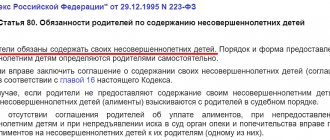The material was checked by an expert: Evgenia Kalinina
Kalinina Evgenia, economist by education and linguist by vocation. Editor-in-Chief of the Alimenty-urist.ru project. Has 11 years of experience working in various publications.
Any developed state regulates, if not all, then very many aspects of the family life of its citizens. And as soon as a child is born, the legislator clearly highlights both his basic rights and the key responsibilities of parents in relation to their child. Unfortunately, sometimes circumstances may arise that are sometimes beyond our control, and it will be better and safer for the child to grow up in an incomplete family under the wing of the mother. We will not delve into the topic of circumstances, which is sore for many people, but will only take a closer look at a very civilized solution to this issue - renunciation of paternity by mutual consent in 2020.
If we open the Family Code, we will not see such a definition there. Legally, this procedure is usually classified as deprivation of parental rights, and the existing reasons and grounds for its implementation by agreement between the parties are set out in Article 69 of the Family Code of the Russian Federation.
Important!
One of the parties cannot simply demand that the other party be deprived of parental rights. This requires compelling reasons such as:
- abuse of one's responsibilities as a parent.
- cruel treatment of offspring. including violence not only physical, but also psychological. Facts that have been confirmed about the abuse of a child and violation of his sexual integrity.
- immoral lifestyle. Availability of a medical certificate indicating alcohol or drug addiction.
- categorical refusal of the parent and reluctance to take the child from the maternity ward or other social institution provided for by law.
- actions of a criminal nature against the health of a minor or a threat to his life. The same is true for other persons.
- malicious evasion of one’s responsibilities regarding the payment of alimony or any other financial assistance.
As we can see, the conditions are more suitable for forced deprivation and this is true. But existing practice shows us successful and quick consideration of this type of case, when the father takes the initiative to terminate his relationship with the child on his own. It is the father’s initiative that acts as a certain key factor in a painless and quick outcome. If the parent is against it, then this will greatly complicate the situation and delay the deadlines in this matter.
Renounce paternity after adoption
The Family Code provides for the possibility of renouncing parental rights after adoption; a separate procedure is provided for this, regulated by Art. 140 RF IC.
Deprivation of the right to adoption is also carried out in the presence of employees of the prosecutor's office and guardianship authorities; after the decision enters into force, the adoption itself is canceled, and the decision, after entering into force, is sent to the state registration authorities, which are located at the place of registration of the adoption announcement.
Art. 141 of the RF IC reveals the grounds for cancellation:
- failure to fulfill parental responsibilities;
- child abuse;
- alcohol or drug addiction;
- inability to establish full-fledged family relationships;
- the desire of the adopted child.
Cancellation of adoption means the end of the relationship between adoptive parents and children. At the same time, the mechanism for canceling adoption does not apply to an adult.
The applicants in this category of cases can also be the biological parents of the child, and if the initiator of the termination of the relationship is the minor himself, then the guardianship and trusteeship authorities or the prosecutor's office act on his behalf. In addition, applicants can be anyone who is concerned about protecting the rights of a minor - for example, a relative, neighbor or teacher.
Application for cancellation of adoption. Sample claim for cancellation of adoption.
Does it exempt the father from obligations?
Abandonment of a child must be truly voluntary; the law considers pressure on the father unacceptable. There should be no blackmail or threats.
Only the court has the right to compel in the presence of sufficient evidence. The father is deprived of the right and responsibility to raise.
He cannot protect the rights of his child. He does not pay alimony if there is a fact of adoption by another man.
The father is deprived of the right to return in old age and demand financial assistance from his child. Such cases are not uncommon. Missing relatives suddenly appear in the lives of adult children, especially successful ones.
Such a father cannot become the child’s heir in the event of his death. Moreover, this rule is followed even if a will is drawn up in the name of the father.
When is alimony paid?
It is important to remember that the father is deprived only of his rights to the child, but not of his obligations - paying child support. The court will remove this obligation from him only in 2 cases:
1. The husband is not the biological father of the child. And there is evidence of this.
It’s interesting: if a man knew that the baby was not his own or he gave written permission to use someone else’s biomaterial for fertilization, then his lawsuit makes no sense. The court will not grant such a request
2. There is a person who is ready to take on all the costs of maintaining the child, for example, the new husband of his ex-wife. Until the court's decision, the biological father continues to have the responsibility to pay compensation on time.
How can a father be deprived of parental rights?
In order to find out how to deprive a father of parental rights, you need to turn not only to the law, but also to the practice of considering cases.
According to the law, in order to deprive both fathers of parental rights in any case, they will have to go to court.
Cases of this category are always considered by district courts.
But which specific court should you go to? There are several options:
- To the court at the place where the father is legally registered.
- To the court in whose territory the plaintiff lives (this is possible if the issue of alimony is immediately considered).
- To the court in whose territory the defendant previously lived, and his other place of residence is now unknown.
What stages will the case go through if there is the father’s consent?
Despite the fact that there is virtually no dispute in this situation, the applicant and the defendant will have to go through all the same stages that this case always goes through, namely:
- file a claim in court (you can read about the correct preparation of a claim here;
- collect evidence that will confirm that deprivation of rights is a justified measure;
- allow the guardian to come to your apartment so that they can inspect the premises;
- the defendant must also allow guardianship into the apartment at his place of residence;
- both parties must appear in court and confirm that they really insist on deprivation of rights;
- the decision made will come into force within a month, just like in other civil cases.
How to consent to deprivation of rights?
In order to provide the court with your consent to the court in case of mutual deprivation of the father’s rights, you can use one of the following options:
- The defendant must appear at the hearing and announce his decision orally.
It is also worth expressing your opinion prematurely to the guardianship authorities, who will document the defendant’s opinion and, based on this, will be able to give a positive conclusion.
When appearing in court, the party's opinion will be indicated in the protocol.
- The defendant may not appear at the hearing itself, but to be safe, he must provide his opinion on the issue of deprivation of his rights in writing:
- Allows simple written form. The defendant must indicate that he acknowledges all the demands, does not want to communicate with the child, and agrees with the deprivation of his rights. He must sign this statement, be sure to date it and submit it himself (or through a representative by proxy) to (one of the options is more convenient for the party):
i. Court office;
ii. On an expedition;
iii. Or you can transfer it to the judge himself, for example, during the preparation of the case.
- If the defendant has absolutely no opportunity or desire to appear not only at the hearing, but also at the office/expedition of the court, then he has the right to confirm his opinion. An application certified by a notary (any one nearest and convenient in terms of territorial accessibility) can be submitted to the court by virtually any participant in the process, including an opponent.
What happens after a decision is made?
After the decision is made, according to all general rules, it comes into force for one month. Interested parties who participated in the case can receive a decision upon its entry into force.
It is worth noting that even if the deprivation of rights was carried out by mutual consent, the same negative consequences occur for the defendant as would have happened if he had objected. For example, such as:
- Obligation to continue to support the child;
- Inability to become an adoptive parent in the future;
- Inability to see or communicate with the child anymore;
- Inability to inherit from a child in the event of his death.
You must understand that in order to deprive a father of parental rights even on both sides, you need to put in a lot of effort and study a lot of materials on this topic. After all, even preparing a claim requires significant knowledge of family, civil, housing, procedural and even tax law.
Our lawyers are specialists in their field who have extensive experience and extensive knowledge in this field.
Call us, we will help you sort out your problems!
Refusal procedure
In order to voluntarily renounce paternity, a citizen will initially need to send a corresponding application to the court and representatives of the guardianship authorities. Next, the father must go to a notary to obtain consent to adopt the children:
- the document may contain specific information about the new adoptive parent;
- It is possible to obtain a permit without providing this information.
After the start of the procedure, the applicant can withdraw his request to transfer parental rights to another citizen within six months. After collecting the necessary documentation, you can contact the district court.
Opt-out procedure by mutual consent in 2020
There is only one option here, this is consideration of the application in court. If the father does not object, this will significantly speed up the procedure. We will consider this option, since challenging paternity goes a little away from the main thesis of this article.
A father who wishes to terminate his duties draws up a notarized document in which he expresses his intention to abandon the child. Copies of this document are sent to the mother and the guardianship authority.
Already with the response from the guardianship authority, a full-fledged statement of claim is submitted to the court at the place of residence of the father, with payment of the state fee in accordance with the regulations of Art. 333. 19 Tax Code of the Russian Federation.
The father will be the defendant here. People from the guardianship authority and the prosecutor will definitely be invited to the court hearing. This is not a criminal process and the prosecutor here will monitor the legality of what is happening and ensure that the rights of a minor in need of protection and guardianship are not violated. If agreed, the court considers the case quickly enough.
How is the procedure done?
In order to quickly deprive the rights of paternity, a whole package of documents must be submitted to the court to prove that the person deserves such a punishment.
If he agrees to deprive the father of his rights, then his written consent must be attached to the list of documents, which must be certified by a notary.
During the court hearing, his refusal is verified, since the parent can cancel this document at any time. However, this must be done before the trial.
In addition to the refusal, you must draw up a correct statement of claim for the court, so it must be filled out correctly and clearly, without errors. The application indicates the entire list of documents that are attached to it.
Also, special attention is paid to the date of preparation; it should not be different from the day the papers were submitted to the court. If the date is backdated or incorrectly indicated, then court officials have the right to refuse to consider the case.
In order to legally deprive paternity, the child’s mother must provide the court with sufficient evidentiary documents that will confirm the claims made in the statement of claim.
For example, you can provide the court with copies of statements from the police against the father, certificates from the emergency room about the beating of the child or his mother, documents from the bailiffs, references from work, statements from neighbors, and so on.
If some of the documents cannot be obtained, the plaintiff may go to court to remove the necessary certificates from the organization.
If the judge considers these certificates necessary for the case, he will give a positive answer.
Documents for deprivation of rights
To deprive parental rights of paternity, you will need to provide these papers to the court:
- child's birth certificate;
- a housing document that confirms the child’s residence with the mother;
- if children or a baby were born out of wedlock, then a certificate of paternity is required;
- document on the salary of the parent (mother);
- evidence of deprivation of paternity;
- receipt of payment of state duty;
- certificates from educational institutions;
- child's medical certificates.
About other reasons
Sometimes it happens that the relationship between parents does not work out. And the father himself harms the psychological health of the child when he communicates with him. Then desperate measures are taken. For example, mothers themselves ask fathers to refuse.
Such steps are taken by the law to protect the interests of the child. If the plaintiffs are able to prove the fact of a negative impact on the minor, then the court may decide to limit contacts.
- If the father is deprived of his rights to the child, then he does not have the right to participate in the upbringing and maintenance in the future.
- Only one obligation remains, related to the transfer of alimony.
- At the same time, the child still retains the right to receive an obligatory part of the inheritance after the death of the father. There will be other consequences.
- Features of the procedure
So that the father can easily refuse to raise and support a minor family member, it is necessary to draw up permission for another person to deal with this issue. Otherwise, the court will not be able to make a positive decision. The document is drawn up both for newborn children and for family members of a different age, but under the age of 18.
If the refusal is forced, then the following have the right to draw up statements of claim:
- Mother of the child.
- Prosecutor.
- Guardianship authorities.
If the mother is not present, then the documents can be submitted by any person replacing her.
Claim for deprivation of paternity.
If the claim is filed in court, you must indicate:
- name of the judicial institution,
- all information about the identities of the parties (information from the passport, telephone numbers, addresses), if representatives act on their behalf, similar information about them will be needed,
- information about the child (from the birth certificate or passport, when the child is over 14 years old),
- data from the marriage certificate,
- data from the divorce certificate (if available),
- the reasons why the plaintiff asks to deprive the father of his rights,
- related requirements (payment of alimony, etc.). Moreover, in this case, the claim must necessarily indicate its price,
- list of applications,
- date and signature.
The following documents must be prepared as attachments to the application:
- an extract about the child’s place of residence,
- passports of the child and the plaintiff,
- a copy of the claim,
- a copy of the marriage certificate,
- a copy of the divorce certificate (if available),
- paid receipt (state duty),
- 2NDFL certificate, if the documents contain the cost of the claim,
- documents that prove that the father really needs to be deprived of his rights.
After the court makes a positive decision in the case, the plaintiff must come to the registry office with a court decision so that its employees issue a new document on the birth of the child.
If the father must renounce his own rights in favor of another man, everything happens much faster.
The procedure can be significantly speeded up by the availability of a DNA test, thanks to which it can be almost certain that there are no family ties between the father and the child.
The court allows witnesses to be invited to prove that the father did not fulfill his duties.
It must be remembered that after the father is deprived of his rights for not fulfilling his duties in good faith, the child still retains some rights:
- He may receive an inheritance.
- His mother has the right to receive child support.
Establishing paternity by DNA: cost, through court, price.
Consequences of failure
Regardless of the reason for which a man was able to formalize a renunciation of paternity, from the entry into force of this document he becomes a complete stranger to the child and no longer has any rights and obligations in relation to him. In particular, it should not contain it, which is one of the main reasons for such actions.
Cancellation of alimony
It should be borne in mind that if, instead of renunciation of paternity, deprivation of parental rights was formalized, this does not exempt from alimony. In the second case, the father simply does not have the right to communicate with the child and somehow participate in his life, but at the same time he is obliged to pay money for maintenance.
FREE CONSULTATIONS are available for you! If you want to solve exactly your problem, then
:
- describe your situation to a lawyer in an online chat;
- write a question in the form below;
- call Moscow and Moscow region
- call St. Petersburg and region







